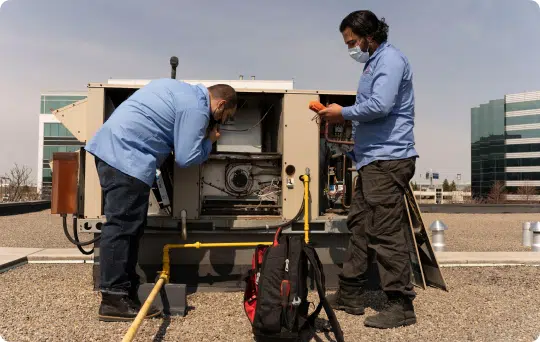Energy-Efficient HVAC Systems to Reduce Energy Expenses
As power costs proceed to rise, the significance of energy-efficient A/c systems ends up being increasingly obvious. These systems not just guarantee substantial cost savings on energy bills however additionally add to a much more sustainable future by reducing energy intake.
Benefits of Energy-Efficient Cooling And Heating Solutions
Energy-efficient a/c systems provide numerous advantages that expand beyond simple expense financial savings. One substantial benefit is the minimized environmental influence. By eating less energy, these systems add to decrease greenhouse gas emissions, aiding to combat environment modification and promote sustainability. This aligns with raising societal needs for eco-friendly practices in property and commercial setups.
Furthermore, energy-efficient HVAC systems commonly supply boosted convenience degrees. Much of these systems feature innovative innovation that enables for far better temperature level control and boosted air top quality (DMAKS HVAC). This brings about a much healthier interior setting, which is particularly important for individuals with allergic reactions or respiratory issues
Additionally, investing in energy-efficient HVAC systems can enhance residential or commercial property value. As more customers prioritize energy performance, homes and structures equipped with these systems might bring in higher quotes in the property market.
Kinds of Energy-Efficient Cooling And Heating Options
Just how can home owners and organizations pick one of the most appropriate energy-efficient heating and cooling options for their requirements? The marketplace provides a selection of energy-efficient heating and cooling systems, each created to boost comfort while minimizing energy consumption.
One alternative is the variable cooling agent flow (VRF) system, which successfully controls the temperature level in several zones within a building. This system adjusts its refrigerant flow to match the wanted temperature, causing considerable power cost savings.
Another prominent option is geothermal heatpump, which make use of the earth's secure temperature level to warm and great spaces. By moving heat to and from the ground, these systems demonstrate outstanding performance, especially in modest climates.
Additionally, ductless mini-split systems provide an energy-efficient choice for homes lacking ductwork. These systems enable zone-specific home heating and cooling, reducing energy waste in empty areas.
Finally, high-efficiency furnaces and a/c, with innovative SEER and AFUE rankings, offer dependable environment control while consuming less energy than typical designs. By assessing these choices, homeowners and companies can choose a heating and cooling system customized to their specific needs and energy performance goals.
Key Attributes to Consider

Following, explore the type of compressor utilized in the system. DMAKS HVAC. Variable-speed compressors can see this website adjust their outcome to match the heating or cooling need, leading to enhanced comfort and energy savings contrasted to single-speed models. Additionally, seek systems geared up with wise thermostats that offer programmable setups and remote accessibility, enabling far better control over energy intake
One more critical attribute is the system's air filtration capacity. High-efficiency filters can enhance indoor air top quality and reduce power usage by ensuring the system runs successfully. Consider the kind of refrigerant used; modern systems often employ green refrigerants that have a reduced environmental impact.
Lastly, ensure that the system is suitable with zoning modern technology, which permits customized temperature level control in various areas of your home, boosting convenience while lessening energy use.
Tips for Picking the Right System


Following, take into consideration power effectiveness scores, especially the Seasonal Power Performance Proportion (SEER) for cooling systems and the Annual Gas Use Efficiency (AFUE) for heater. Greater ratings show better effectiveness, which can lead to substantial cost savings on energy costs in time.
Additionally, review the sort of heating and cooling system that finest suits your lifestyle and budget plan. Alternatives include central air conditioning, ductless mini-splits, and warm pumps, each with its very own collection of advantages and drawbacks.
Do not forget the value of proper installation and sizing; an improperly sized system can bring about inadequacies and enhanced wear. Consult with a specialist HVAC specialist to obtain skilled recommendations tailored to your home's special needs. This extensive strategy will make sure that you choose an energy-efficient cooling and heating system that meets your needs and budget efficiently.
Upkeep for Optimum Efficiency
Once the best cooling and heating system is in place, continuous upkeep comes to be crucial to ensuring optimal effectiveness and durability. A properly maintained system runs better, causing reduced power intake and reduced utility expenses. Routine assessments and tune-ups must be set up at the very least twice a year-- when before the air conditioning period and when before the heating season.

House owners should additionally be alert concerning monitoring their cooling and heating system's efficiency. Unusual noises, rising and fall temperatures, or boosted energy expenses can show underlying problems that call for prompt attention. By resolving these concerns promptly, house owners can protect against costly repair services and expand the lifespan of their systems.
Purchasing a maintenance strategy with a certified technician not only boosts efficiency however additionally provides assurance, understanding that the system is running at its best. DMAKS HVAC. Routine maintenance is consequently important for sustaining energy performance and reducing overall operational costs
Final Thought
To conclude, energy-efficient HVAC systems present a practical option for minimizing energy expenses while enhancing comfort and air quality. By incorporating advanced modern technologies and options such as geothermal warm pumps and ductless mini-splits, property owners can achieve significant power savings and contribute to environmental sustainability. Careful consideration of system attributes and recurring maintenance better guarantees ideal performance, making web link energy-efficient systems a sensible financial investment for both economic and environmental benefits.
Comments on “Efficient Heating Repairs Done Right by DMAKS HVAC Experts.”